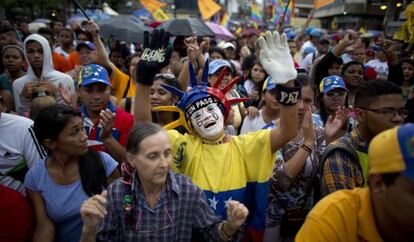Venezuelan opposition groups forced to unite ahead of crucial polls
December 6 elections will put the strength of the MUD coalition to the test

The scene takes place in Chacao, but it is seen in other places such as Petare, or the neighborhood of Pinto Salinas – areas that represent the different ecosystems of Caracas, which is facing a year-end that will no doubt determine the course of the coming months. “At the bottom, on the left, in the corner, the little hand.” Supporters of the Democratic Unity Roundtable (MUD), the coalition of Venezuelan opposition groups, can be heard using this radio-friendly, catchy song to remind Venezuelans of how to find its candidates on the electoral ballot.
The use of the song is not just about election propaganda though. The tune is aimed at stopping voters from confusing MUD with a pro-government party that also has the word “unity” in its name, and is listed right next to the opposition on the ballot sheet. And more importantly it’s aimed at drilling into voters’ heads the fact that they must get out and vote on Sunday. According to the opinion polls, the opposition may find itself in an unprecedented situation after 16 years of Bolivarian Revolution: it may win a majority in the National Assembly.
This unprecedented victory could become a source of new tension, testing a coalition whose individual groups do not always get along
But such an unprecedented victory would have to be won in the face of a number of adverse circumstances, such as an election law that is evidently harmful to opposition members due to the way that parliamentary seats are allotted. As such, rather than strengthening their precarious alliance, a win could become a source of new tension, testing a coalition whose individual groups do not always get along.
Until now, their rejection of the chavista regime has served as a unifying force. But the opposition has rarely reached agreement on how to defeat the ruling party, a problem that threatened to split the organization in 2014 when a group led by María Corina Machado and Leopoldo López began a movement called La Salida, which some saw as an attempt to depose President Nicolás Maduro. They clashed with the largest bloc within the coalition, a party led by the two-time presidential candidate and Miranda state Governor Henrique Capriles Radonski. Capriles had insisted on waiting for elections while trying to convince more working-class voters to support the opposition. Even today, many MUD supporters and leaders close to Machado and López – who has spent nearly two years locked up in a military facility in Ramo Verde – are critical of Carpiles. They have not forgiven him for refusing to call for demonstrations after losing the presidency to Maduro in 2013 by a slim margin.
With La Salida snuffed out, internal negotiations to select the list of parliamentary candidates led to a number of disputes. In March 2015, MUD decided to choose a platform based on consensus among its various parties and to hold primaries only when this method failed. After a torturous process that lasted until June, party leaders agreed on 127 candidates and party members elected another 40.
The tactic was also an attempt to minimize the damage internal clashes might cause. Even so, some of the hopefuls who did not win decided to run independently and polls now show that 10 percent of citizens intend to vote for them. For example, Eduardo Gómez Sigala, the businessman and deputy for the midwestern state of Lara, is closing in on MUD candidate Alfonso Marquina. Some sources even say Gómez has taken the lead.
MUD members joined forces because, in some ways, this election is a plebiscite. It is more important to vote as one bloc than for a particular candidate to win. They’ve thus avoided having one leader dominate the others. Although the group’s spokesman, Jesús Torrealba, has the backing of all opposition leaders, each party carried out a separate campaign. MUD is holding its last campaign rally today and yet Capriles, María Corina Machado and Lilian Tintori, who has become her husband’s alter ego, have not been seen together at an event since the beginning of the year.
English version by Dyane Jean Francois.
Tu suscripción se está usando en otro dispositivo
¿Quieres añadir otro usuario a tu suscripción?
Si continúas leyendo en este dispositivo, no se podrá leer en el otro.
FlechaTu suscripción se está usando en otro dispositivo y solo puedes acceder a EL PAÍS desde un dispositivo a la vez.
Si quieres compartir tu cuenta, cambia tu suscripción a la modalidad Premium, así podrás añadir otro usuario. Cada uno accederá con su propia cuenta de email, lo que os permitirá personalizar vuestra experiencia en EL PAÍS.
¿Tienes una suscripción de empresa? Accede aquí para contratar más cuentas.
En el caso de no saber quién está usando tu cuenta, te recomendamos cambiar tu contraseña aquí.
Si decides continuar compartiendo tu cuenta, este mensaje se mostrará en tu dispositivo y en el de la otra persona que está usando tu cuenta de forma indefinida, afectando a tu experiencia de lectura. Puedes consultar aquí los términos y condiciones de la suscripción digital.








































